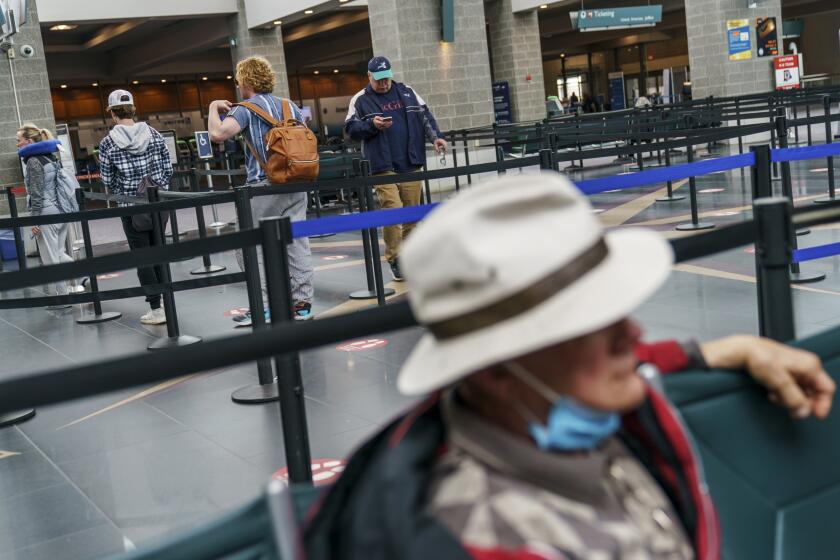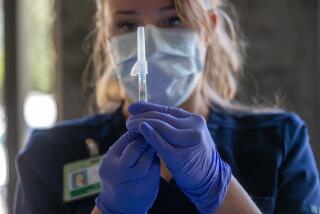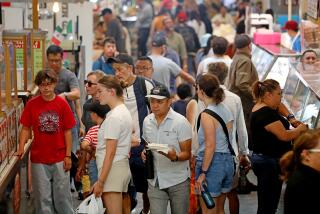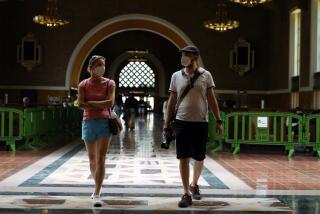The new mask-optional phase of the pandemic fuels fears, and some cheers
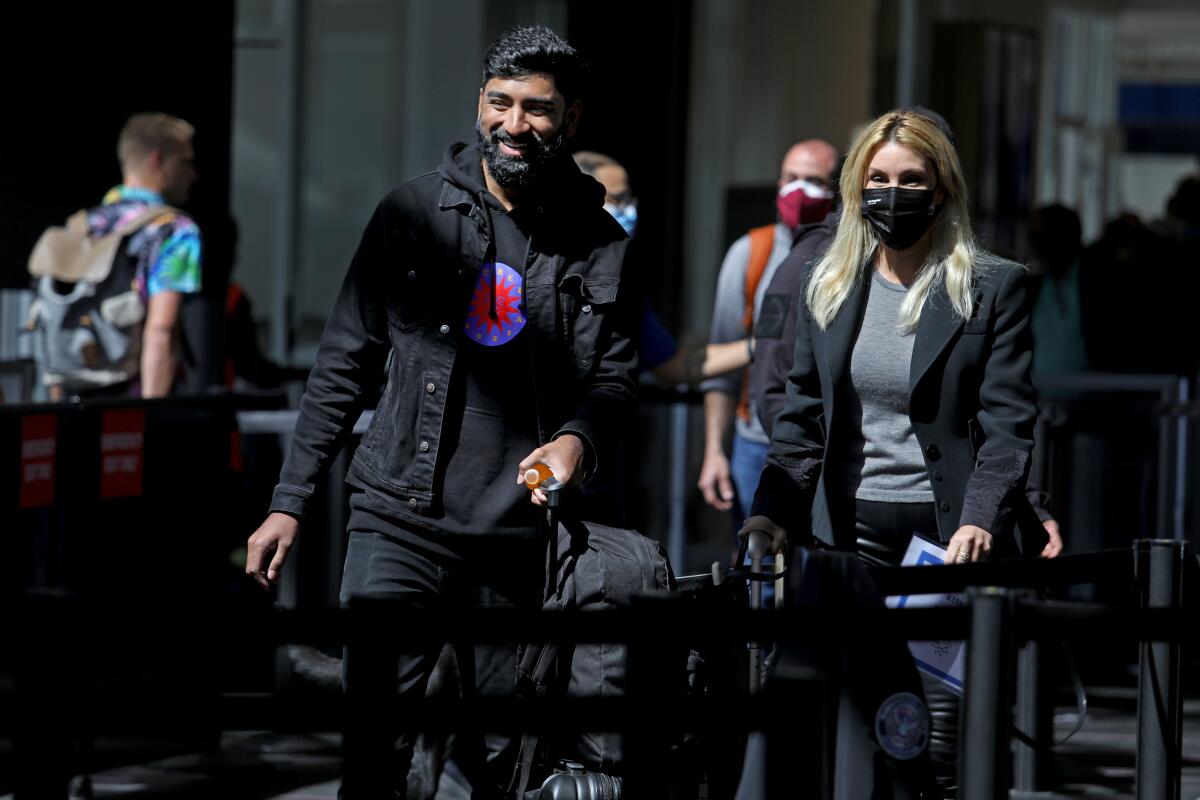
- Share via
A new mask-optional phase of the pandemic is arriving, sparking concern from some experts that the shift is occurring too soon.
For months, local officials have been easing mask rules in public places, such as supermarkets and shopping malls. But a federal court ruling Monday striking down the federal mask-wearing order on public transportation systems accelerated the trend, with Uber, Lyft, many airlines and transit agencies making face coverings optional.
In one section of Los Angeles International Airport on Tuesday morning, an estimated 30% to 40% of travelers were not wearing masks.
“It’s about time,” tweeted Rep. Mike Garcia (R-Santa Clarita).
But parents of young children who cannot get vaccinated and as well as advocates for people with compromised immune systems are alarmed.
While new COVID-19 hospitalizations are at among their lowest levels nationally, cases are rising slowly — from 25,000 to 37,000 a day over the past two weeks. Nearly 400 people in the U.S. are dying of COVID-19 daily.
It’s unclear, for now, whether the lifting of the mask order on public transit will dramatically worsen the pandemic, given relatively high levels of immunity due to vaccinations and widespread infections of the Omicron variant over the winter.
There has been some optimism that California and the U.S. can avoid a significant spring surge. While some European countries (such as Britain) have suffered a second big Omicron surge, others (such as Spain) have avoided one.
But making masks optional too soon on transit could create more vulnerabilities if another variant comes along, or the latest Omicron subvariant circulating in New York ends up becoming particularly troublesome.
“It’s just premature to have had it lifted,” UCLA epidemiologist Dr. Robert Kim-Farley said of the ending of mask requirements on airlines, airports, buses and trains nationwide, which followed the order of Florida U.S. District Judge Kathryn Kimball Mizelle in Tampa striking down the federal mask-wearing order on public transportation systems.
The U.S. Department of Justice said it will appeal the judge’s order if the Centers for Disease Control and Prevention concludes a mask-wearing order for transportation is still needed for public health. The Justice Department said it believes the CDC has the authority to issue a mask-wearing order on public transit, which has been in effect for about 15 months.
A previous directive, issued by the Transportation Security Administration at the CDC’s recommendation, was initially expected to expire on Monday. Last week, the CDC said the mask order would continue so scientists could study the potential impact of rising coronavirus cases, and TSA extended mask-wearing rules through May 3.
Scientists at the CDC “had asked for 15 days to make a more data-driven durable decision,” tweeted White House COVID-19 Response Coordinator Dr. Ashish Jha, and “we should have given it to them.”
President Biden, when asked by a reporter Tuesday if people should be wearing masks on planes, replied: “That’s up to them.”
The CDC and a number of public health experts have urged people to still wear masks on public transit, given the rise in transmission and the appearance of the Omicron subvariant BA.2.12.1 — believed to be 25% more contagious than its parent subvariant, BA.2, which has dominated the nation.
A notice of appeal was filed in federal court in Tampa Wednesday.
The Justice Department is filing an appeal seeking to overturn a judge’s order that voided the federal mask mandate on planes, trains and travel hubs.
BA.2.12.1 now is estimated to make up 19% of cases nationwide, including more than half of the cases in the New York and New Jersey area.
“I really don’t think it’s a smart decision,” said Yifang Zhu, an aerosol scientist and professor in the department of environmental health sciences at the UCLA Fielding School of Public Health, of lifting the mask requirement for transit.
“If someone has contracted COVID and the virus gets released into the cabin air ... it’s going to be distributed across the whole cabin. There is no physical distancing that you can keep in such a confined environment,” she said.
Air filtration systems do help, but “the air doesn’t get immediately filtered out at the point that it gets out of people’s mouths,” Zhu said. Buses and subways, in turn, can be more or less risky depending on the air flow and how crowded they are, she said.
Immunocompromised people and others worried about the virus can get some protection by wearing an N95 or KN95 mask, but masks are especially effective as a method of “source control” — a way to prevent someone who is contagious from spreading the virus, she said. If you had only one mask for two people — one infected, one not — you would want to give it to the infected person, Zhu said.
“It’s better than nothing” for vulnerable people to wear masks when others go without them, she said, but “you are protecting others and the community as a whole if everybody just does a little extra effort.”
Immunocompromised people expressed alarm about the ruling. Already pushed to the background of many pandemic discussions, many now face an unenviable proposition: either risk traveling where many people won’t wear a mask, or cancel much-anticipated plans to visit friends and family.
Janet Handal, president and co-founder of the Transplant Recipients and Immunocompromised Patient Advocacy Group, had been planning to fly to see family in Texas she hadn’t seen in more than a year.
Now, “I just don’t know what I’m going to do,” said Handal, a kidney transplant recipient who lives in New York City. She is unconvinced that researchers have adequately assessed whether wearing a mask will be enough to protect someone who is immunocompromised if others around them are going maskless.
“As a person who is immunocompromised, I feel that is discriminatory against me because it puts me at very high risk,” she said of the court decision. “I don’t understand why we should have to live less of a life than anybody else.”
In the aftermath of the judge’s ruling, the L.A. County Metropolitan Transportation Authority, Metrolink and the L.A. Department of Transportation’s downtown DASH and Commuter Express bus service are no longer requiring riders to wear face coverings.
At Los Angeles International Airport, passengers were having to make their own choices about masking up.
Terrence Littlefield, 35, traveling with United Airlines on Tuesday said he was happy that the choice of whether to mask was now up to travelers, though he would personally opt to mask during the flight.
“With the spike right now, I think people should take it into their own hands and be conscientious about how you feel and gauge how comfortable you feel,” he said.
Yazmin Quirino, 35, who works for special services at LAX, said her husband is diabetic and she will continue wearing a mask regardless of the airport’s announcement yesterday.
“ I know there are still variants out there and I don’t want to get my family sick,” she said.
For some, the decision is far more wrenching than a matter of convenience.
Handal, of the Transplant Recipients and Immunocompromised Patient Advocacy Group, said that although airlines have touted their filtration systems, those systems are not required to be running when planes are sitting at the gate. She has used a carbon dioxide monitor to gauge air quality on a flight and been troubled by the readings, which she uses as a proxy for the level of aerosols being exhaled into the air.
And even in an environment where not many people are infected, chances can be high that someone in a crowded setting like an airplane may be positive and not know it.
In Philadelphia, Corey Corrigan was devastated by the news. She had been planning to take her 2-year-old daughter Harper, who has cerebral palsy and is at high risk for respiratory illness, to Massachusetts for an intensive form of physical therapy.
Harper has a tracheostomy and uses a ventilator to help her breathe. The family has struggled to keep a mask from sliding off her tiny nose.
Traveling a long distance by car can be difficult with her medical equipment and carries its own risks of getting infected along a lengthy journey, so Corrigan had planned to take her for a quicker trip by plane or train to Massachusetts.
“Now we can’t,” said Corrigan, who works as a consultant. The family has also set aside hopes of visiting grandparents in Seattle who have never met the toddler, including one grandparent who was diagnosed with serious illness during the pandemic.
“Even if Harper gets her vaccine, we’re not going to be comfortable taking her on a plane with a bunch of unmasked people,” she said.
The news of the court ruling was deflating, but “honestly, it’s something that I’m used to — in a bad way — at this point,” Corrigan said. “I’m just used to being continually let down and feeling like my daughter is dispensable to other people.”
More to Read
Sign up for Essential California
The most important California stories and recommendations in your inbox every morning.
You may occasionally receive promotional content from the Los Angeles Times.
